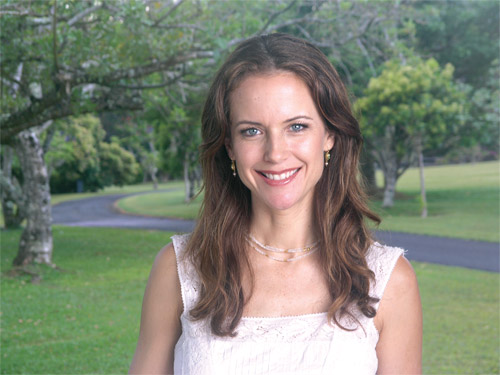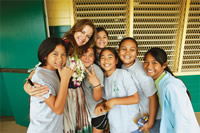 Interview with Kelly Preston
Interview with Kelly Preston

What made you decide to bring Narconon to Hawaii?
I was born and raised in Hawaii, it's where I call home and where I feel spiritually connected. A year and a half ago I saw a documentary by film-maker Edgy Lee called "Ice" (a street name for crystal methamphetamine) and it absolutely devastated me. I knew that the drug problem in Hawaii had worsened, but I had no idea to what degree. Hawaii has an ice epidemic. It's not only in schools but also affects parents, who sometimes abandon their kids.
I realized I could help and knew if I were to bring Narconon to Hawaii, something could be done about the problem.
It seemed obvious that the most important place to start would be with the kids because they are not usually taught the truth about drugs even though they need to know what drugs are, what they do to your body and what happen to you if you take drugs.
What were your experiences with drugs growing up as a kid in Hawaii?
When I was growing up there, I swore with my girlfriend Simone that we would never try drugs. But, so many of our friends were smoking and drinking that I fell into it too. I was fifteen before I started, which was later than a lot other kids, but it was downhill from there. By the way, it's not true that pot does not lead to other drugs — it does. I started drinking. I started doing Coke, Quaaludes, a lot of different drugs — mushrooms, you name it. It was a dwindling spiral that went on for years.
It wasn't until I got off of drugs using the effective methods employed by Narconon that my life started to turn around.
Getting off drugs was the greatest gift — I felt like my life was given back to me. Now, I'm surrounded with so much opportunity and everything I've ever wanted.
Have you seen Hawaii change with the increasing drug use?
It's gotten worse, as has the rate of crime — which touched me in a rather personal way. I had a little beach house in Hawaii that I would go to with family every year — I have a big extended family that I'm really close to. When I was away, a guy on ice broke into my house and planned to camp out there. My caretaker noticed the alarm had gone off, went to check on it, found this guy and called the police. They later found a pail in the house filled with ice.
That was a very personal experience and it helped push me to decide I couldn't sit by and do nothing. I had too many tools at my fingertips to not take responsibility for this island, its people and my home.
What are the missing ingredients in the current efforts to prevent addiction?
I think the main missing ingredient is the truth about drugs, what they do to your body and how addictive they are. Also the truth about how drug dealers, who are often young kids, go about getting new people addicted. The pushers are usually addicted themselves and the intricate messages they use to entice other kids are staggering.
The Narconon educational videos show former drug dealers, just kids themselves, explaining what they did and said to lure people in. They target certain kids at parties and go after them.
The Narconon drug education lectures are effective because they include the children, they get them involved and they get them thinking for themselves. The drug educators relate the information to their own experiences and warn kids about what they will encounter. They strengthen and fortify the kids' ethics and convictions so they can resist temptation and peer pressure — and know why they are resisting it.
It's not good enough to just say "no." You have to have conviction and understanding. That's what the Narconon drug education lectures deliver.
What makes the Narconon program different?
The Narconon program works. And it works without drugs.
When you talk to former addicts they tell you the Narconon method is relatively painless. Of course they go through stages of withdrawal, there's no way to avoid that, but what they say about Narconon is that it helps them finally take charge of their own lives. Many addicts have gone through rehab after rehab and feel drained of all hope. Many have even been told that their chances of getting off and staying off of drugs are slim.
With the Narconon program, these people not only get their hope back, they get off of drugs — for good — because the Narconon program gives them the tools to gain back the control of their own life and to live life productively.
These are unique and practical tools that have been developed that have lead to tens of thousands of people, children and adults, getting off drugs and millions staying off drugs.
What about this idea of "teaching kids how to use drugs responsibly?"
It's abhorrent — it's a completely insane approach. You've got to understand where this is coming from. There are groups who claim that you'll never be able to stop kids from trying drugs, so the best you can do is teach them how to use drugs safely.
These same groups put instructions on their websites such as: "If you're going to do ecstasy, this is how you do it" or "if you're going to do acid, make sure you're in a safe environment," and so on. This is a reflection of failed approaches to the problem.
There is no safe way to use drugs.
You can teach kids about drugs and they can choose a different life for themselves.
What kind of problems do parents run into when they try to help kids in this area?
I think parents don't always understand how things have changed since they were young. Drugs these days are so much stronger than when we were kids and they're much more prevalent. Also, kids are not only faced with pot and drinking, but also prescription drugs — the use of psychiatric drugs has escalated enormously. Over 17 million kids are prescribed psychiatric drugs today. It's an industry which makes tens of billions of dollars every year. That's all part of today's drug scene. I think it's important for parents to better understand the real environment in which their kids live.
What other barriers do parents encounter?
Parents don't understand the subject of drugs. They themselves don't know the truth about drugs. They don't know how to communicate over the generation gap — they lack tools.
A lot of parents may have done drugs or are still doing drugs — there are parents who drink quite heavily. This makes it harder for them to talk to their kids about drugs.
Parents don't know the truth about drugs personally and they need to know that the people who survive and do the best are those who don't "use".
Parents often don't recognize the signs of drug use and don't know what to do when there is a drug problem.
Sometimes they flatly deny the problem and don't want to think it is happening to their kids. Especially through those pre-teen and teenage years, communication often drops between parents and their children. Ironically, this is when communication is even more important.
What would you like to see for the children of Hawaii?
My hope for the children of Hawaii is that they make the correct choices to stay drug and alcohol free.
Children are bombarded constantly with drugs and temptations. They are inundated with false information about drugs in the media. Whether it's in commercials, films, on the playground, or at parties — it's all over the place. If we're able to educate them truthfully about drugs, we can help give Hawaii back its children and its future.
What have you done so far to "educate" Hawaii?
I recently filmed a Public Service Announcement that encourages parents to talk to their kids about drugs and tells them how to obtain a free kit (see below) to educate their kids about drugs. This kit really gives parents the tools they need to talk to their kids in a non-threatening manner and to have an open and sane dialogue with their children.
The PSAs have started airing and hundreds of kits have already gone out to the parents of Hawaii — with hundreds of more requests continuing to flood in. We just launched this campaign and it is has been very well received. Parents love it! It has been so successful, we're planning on taking it across America.
I also talked with more than 200 different decision makers and leaders throughout the community. I spoke to people in the Health Department, in public and private schools, community leaders, the Attorney General's Office, the Drug Administration, the Chief of Police and the Lieutenant Governor. What I found is that there are many good people out who are all onboard to work together to make a difference.
What kind of results is Narconon getting so far in Hawaii?
We have reached over fourteen thousand children with drug education lectures. Their success stories would make you cry. They say things like, "I was starting to experiment and now I realize that I don't want to do that any more and I'm never going to." As a parent, that touches me deeply because it represents a child whose entire life just changed for the better.
I've been so embraced — there are so many amazing people who have come forward to help. Something like this is never done alone — it comes down to many people each doing something in their own communities to take back control of something that has spiraled out of control.
Thank You. I'm sure we'll be hearing more from you soon.
Thank you. You bet you will!


